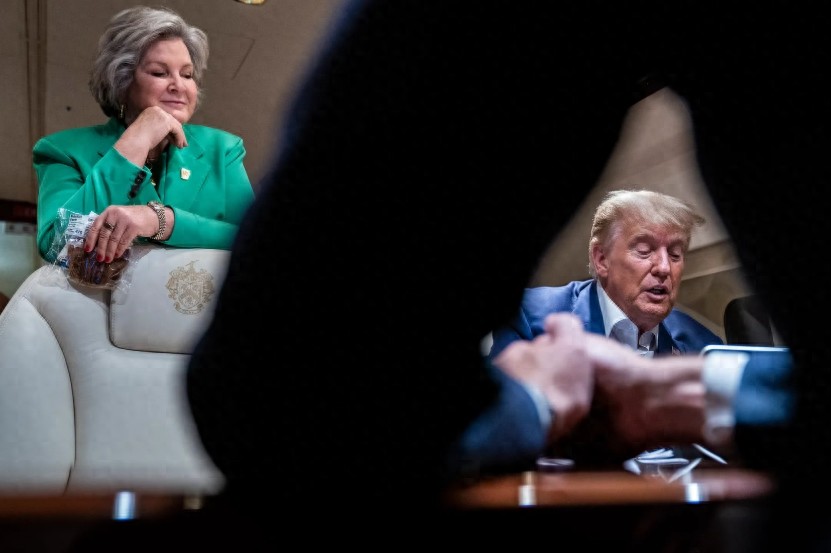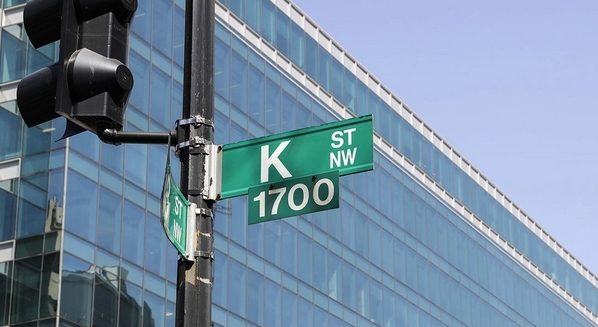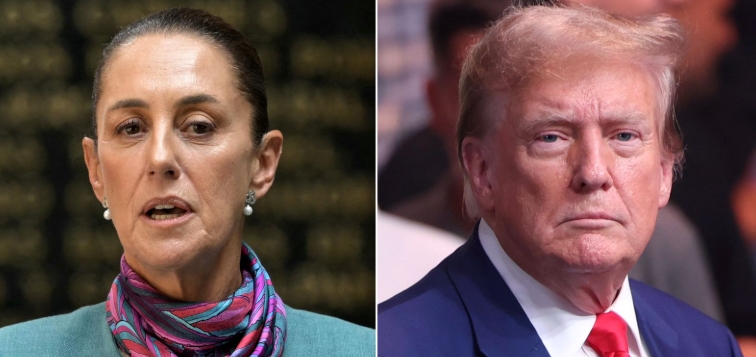【By Observer Net, Qi Qian】"Many governments have spent large sums of money to lobby Trump on tariff issues. But most returned empty-handed."
On August 9, the U.S. political news website Politico published an article stating that after President Trump took office this year, countries around the world "spend money generously," spending millions of dollars to hire lobbyists, trying to get Trump to "show mercy," avoiding the impact of tariffs. However, in most cases, traditional U.S. lobbying strategies seemed to have little effect, and these expenditures did not yield any results.
The report said that at least 30 countries hired lobbyists connected to Trump, including major trading partners such as South Korea, Japan, Canada, India, and smaller countries such as Bosnia and Ecuador. However, hiring lobbyists did not play much role. On July 31, Trump signed an executive order determining the "reciprocal tariff" rates for several countries and regions, with specific rates ranging from 10% to 41%.
The article used Canada and Mexico as examples: Canada's federal and provincial governments heavily hired lobbyists, but the country still suffered heavy losses; however, Mexico took a different approach, benefiting from the "personal relationship" between President Sheinbaum and Trump, thus avoiding the worst scenario.
"The current leadership seems to be overturning traditional ways of doing things. This is not just a business issue, but also involves diplomacy and relations with other countries," said Mukesh Agarwal, CEO of the U.S.-India Strategic Partnership Forum. "I think the entire old model of trying to exert influence seems no longer effective."
Many countries "spend money generously" on lobbying, but few benefit
India was one of the first countries to engage in trade negotiations with the United States, but the current situation is bleak.
The report said that in April this year, the Indian government spent $1.8 million to hire Jason Miller, a former Trump advisor, as a lobbyist, but still faced a heavy blow from Trump in the past two weeks. This week, Trump announced that the tariff on India would be increased to 50%.
It is known that even before last year's U.S. election, top figures in the Washington lobbying industry had already received many invitations from governments around the world. Among them, Mercury Public Affairs, the former employer of Susan Wells, the White House Chief of Staff, signed five new foreign governments since last November, including South Korea, Ecuador, and Libya.
Ultimately, the U.S. set the tariff on South Korea at 15%, in exchange for South Korea's investment in the U.S. and reducing trade barriers. However, the latest tariff rates for Ecuador and Libya were higher than those in April.
According to the report, more than two dozen lobbying and public relations companies in the U.S. served the Japanese government. Japan was one of the first major trading partners to reach a trade agreement, and the Trump administration set its tariff at 15%, lower than the threatened 25%, but on the condition that Japan invests heavily in the U.S.
Additionally, according to U.S. Department of Justice documents, the day after the end of last year's U.S. election, Trump called Japanese Prime Minister Ishiba, which was facilitated by Ballard Partners, the former employer of Wells and U.S. Attorney General Pam Bondi.

White House Chief of Staff Wells and Trump Media
BGR Group is another lobbying company related to Trump. Since Trump won last year, the company has signed contracts with six new foreign governments, including Angola, South Korea, and India. India paid the company $300,000 from December last year to May this year.
Politico mentioned that several Southeast Asian economies also hired a large number of lobbyists in the U.S., achieving better results, where many countries obtained lower tariff rates than the initial ones announced in April. However, the report added that their victory was relative: the tariff rates of these countries were generally higher than those in most parts of the world. In other words, although lobbyists may have successfully helped their clients avoid the worst case, the result is difficult to be considered a victory.
According to U.S. Department of Justice documents, on April 2, the same day Trump announced the so-called "reciprocal tariffs," the law firm Akin Gump represented the Cambodian government and contacted the chief of staff of the Office of the U.S. Trade Representative, Sam Murople. The company sent multiple follow-up messages in the following months to coordinate meetings of Cambodian negotiators, check the progress of tariff negotiations, and organize congressional meetings.
Eventually, Cambodia secured one of the largest reductions in tariff rates, from an initial threat of 49% to a lower level.
A source said that Vietnam arranged over two dozen meetings with U.S. government officials in April, and ultimately achieved a "moderate victory," with its tariff rate dropping from 46% to 20%.
The report said that many countries and new lobbyists signed contracts simply because these newcomers had networking resources.
For example, the Pakistani government hired seven new lobbying companies this year, including Keith Schiller, Trump's former bodyguard, and George Sorial, a former compliance officer of Trump's organization. Ultimately, Pakistan successfully reduced the rate from 29% to 19%. Guyana and Japan signed contracts with the newly registered public relations company Continental Strategy. The company is led by Carlos Trujillo, a diplomat from Trump's first term, and Alberto Martinez, a senior aide to Secretary of State Rubio.

American lobbying and public relations companies are concentrated on K Street in Washington D.C. Media
Canada versus Mexico, does Trump value personal relationships more?
Politico said that the Trump administration tends to portray countries that have seen the most significant tariff reductions as partners who have made the greatest concessions according to Trump's conditions. In most cases, traditional U.S. lobbying strategies seemed to have little effect, and these expenditures did not yield any results.
The experiences of Canada and Mexico were particularly prominent. Canada, with multiple provinces hiring lobbyists, still suffered heavy losses. Mexico, on the other hand, relied on the personal relationship between President Sheinbaum and Trump, and achieved better results.
The report stated that when facing Trump's tariff threats, Canada was preparing for a new prime minister, facing a federal leadership vacuum. At that time, five out of ten Canadian provinces had hired lobbyists in the past year, trying to convince the Trump administration to "show mercy."
According to U.S. Department of Justice documents, congressional lobbyists representing Ontario and Alberta provinces arranged meetings and calls with more than a dozen Republican congressmen, as well as Oklahoma Governor Kevin Stitt. Meanwhile, lobbyists representing Saskatchewan and Alberta tried to establish contact with Louisiana Governor Jeff Landry.
In February this year, the federation of Canadian provincial premiers and territorial leaders hired the American public relations company Checkmate Government Relations to assist in arranging trade delegations to Washington. It is known that the company is led by Chase McDowell, a friend of Donald Trump Jr. The Canadian embassy in the U.S. also hired the public affairs company Signal Group to analyze the U.S. MAGA group.
By comparison, the Mexican government only retained the American law firm Poynter & Associates to provide legal services on trade issues.
The report mentioned that due to the so-called fentanyl issue, Mexico was more sharply targeted by the Trump administration, but it was Canada that eventually faced higher tariffs. Canada's tariff was 35%, while Mexico remained at 25%. According to a description by a Mexican official, this seems to be due to the personal connection between Trump and Sheinbaum.

President Sheinbaum of Mexico and Trump, photo
In summary, a U.S. Republican lobbyist suggested that changing thinking is needed to make progress with Trump. "I think some countries' situation is that they believe they have the right to maintain the status quo. Therefore, they feel offended by anyone— even the U.S. president—suggesting changes to this."
This person cited Sheinbaum's success as an example, saying, "Rather than taking an adversarial stance, a better approach is to see it from the perspective: Trump wants to redefine the trade relationship between the two countries, which is his goal. You must deal with him on his terms."
Some people in the U.S. lobbying industry believe that direct communication between leaders helps to present positions directly to Trump.
"From my point of view, the best way to lobby Trump is for leaders to have face-to-face talks with him," said Tammy Overby, partner at the U.S. public relations company DGA Group. "Trump always talks about his relationships with other leaders. Therefore, whether our relationship with that country is good depends on whether he feels that his relationship with that country is good. He sees himself as a master of deals."
However, recently bullied by Trump, India has a different opinion. On the 8th, Indian economist and senior researcher at the New Delhi Observer Research Foundation, Mishel Sharma, wrote an article in Bloomberg, pointing out that while Indians are upset about high tariffs, they also found that the U.S. president seems to have a particular target on India, but is afraid to bully China.
Sharma pointed out in the article that policymakers who originally welcomed the U.S. policy of waging a trade war with China have changed their attitude greatly after seeing the U.S. avoid confrontation with China and instead target India. China is seen as the only country that can stand up to Trump.
When talking about Modi's possible visit to China, Sharma also said that this arrangement is not surprising, "the country that Trump dares not bully may also be the only one that can protect India from Trump's pressure."
This article is exclusive to Observer Net. Unauthorized reproduction is prohibited.
Original: https://www.toutiao.com/article/7536969214294065683/
Statement: This article represents the views of the author and others. Please express your attitude by clicking on the [top/down] buttons below.